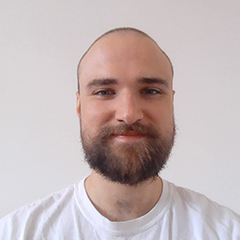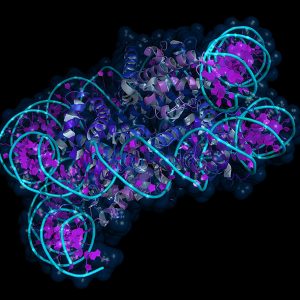Low Input Epigenomics
9–16 May 2025
Wellcome Genome Campus, UK
Learn the latest approaches to analysing chromatin biology and its effects on gene expression at the gene and genome-wide levels in rare cell populations.
Summary
Our understanding of eukaryotic genomes has benefitted tremendously from whole genome sequencing projects. However, we are only beginning to systematically understand how the interplay of DNA, proteins and, biochemical modifications (i.e. chromatin) can influence global processes which control gene expression, mRNA splicing, and DNA replication or repair in normal development and disease states.
This hands-on practical course provides training in some of the experimental and computational approaches that may be used to mechanically dissect important aspects of chromatin biology at the gene and genome-wide levels in rare cell populations.
What will this course cover?
Attendees will receive intensive wet laboratory and computational training using various state-of-the-art methods requiring fewer than a thousand cells input. This bridges the gap between the standard bulk epigenomic approaches, often requiring inputs of millions of cells, and emerging but costly single-cell techniques. The content will include design, laboratory, and analytical aspects of:
- Cleavage under targets and release using nucleases (CUT&RUN) and Cleavage under targets and tagmentation (CUT&Tag) to profile histone marks and transcription factor binding.
- Low-C to map the 3D structure of the genome and interactions between regulatory elements and gene promoters.
- Omni-ATAC to assess chromatin accessibility.
- Computational methods using various pipelines to analyse low-input genomic data and visualisation.
Who should attend this course?
This course is open to senior PhD students, early career postdoctoral scientists, or junior faculty members who wish to interrogate epigenomic features on a low input scale from anywhere in the world.
Learning outcomes
What will you achieve?
After completing this course, you will be able to:
- Perform CUT&RUN, CUT&Tag, Omni-ATAC, and Low-C techniques, including experimental design, endpoint analysis and validation (qPCR, TapeStation)
- Apply genome sequencing methods for low input genomic analysis
- Perform end-to-end analysis of low input genome sequence data from raw sequence to identifying loci of biological importance
- Explain how low input genomic methods can be applied in development and disease research
Programme
This residential course will start at approximately 9am on Friday 9 May 2025 and close at approximately 15:00 on Friday 16 May 2025. All times are in GMT.
The course will cover the following techniques:
- CUT&RUN and CUT&Tag to profile histone marks and transcription factor binding
- Low-C to map the 3D structure of the genome
- Omni-ATAC to assess chromatin accessibility
- End-point analysis using qPCR and Tape station techniques
- Computational analysis of low input gene level and genome-wide data to determine the interplay of DNA, proteins and chromatin modifications in biological processes
These sessions will be supplemented with pre-course training on Linux and UNIX basics, hands-on tutorials and demonstrations, and guest seminars from global experts. Attendees will also have the opportunity to discuss their research interests and present aspects of their own work relevant to the course during a poster session.
A draft programme will be available soon.
Instructors and speakers
Organisers

Christopher (Kip) Arlidge
Canadore College, Canada

Noelia Díaz
Institute of Marine Sciences (ICM-CSIC), Spainnoelia

Kinjal Desai
The Hospital for Sick Children Research Institute, Canada
Instructors and assistants

Fabian Groll
The Institute of Cancer Research, UK

Noura Maziak
MRC-LMS London, UK

Lisanne Mout
Princess Margaret Cancer Centre, University Health Network, Canada
Wellcome Connecting Science - Learning and Training

Alice Matimba
Head of Training and Global Capacity

Nicola Stevens
Event Organiser

Cassandra Soo
Laboratory Courses Manager

Martin Aslett
Informatics Manager

Monica Abrudan
Informatics Education Developer

Aaron Dean
Laboratory Technical Officer

Christoper Adamson
Laboratory Administrative Officer

Vaishnavi Vikas Gangadhar
Informatics Technical Officer
How to apply
Prerequisites
Applicants should have basic molecular biology laboratory skills. Computational training during the course will include the use of Linux/UNIX command line thus an ‘Introduction to Linux for biologists’ pre-course module will be provided for completion prior to the course.
How to Apply
- Start the application
- Click on the “Apply” button above to start your application. Please note that places are limited and will be awarded based on merit.
- Demonstrate the course’s relevance to your project/role
- Our courses are highly subscribed, so it is essential to clearly show how the skills you will learn in the course will be directly applicable and beneficial to your current role/project and how do you plan to disseminate the knowledge after the course.
- Preference will be given to applicants who are currently working on related projects or soon will be.
- Add any other relevant information {delete if not necessary}
- Letter of recommendation
- Applications must be supported by a recommendation from a scientific or clinical sponsor (e.g., supervisor, line manager, or head of department). Ensure that your sponsor provides a tailored supporting statement by the application deadline. This statement must be uploaded as a PDF document to the registration system within your application. Applications without a supporting statement will not be considered.
- Need help?
- If you encounter any problems with the online application process, please contact us at courses@wellcomeconnectingscience.org for assistance.
Application deadline: 11 February 2025
Travel visas
Citizens of many countries can travel to the UK to attend a course or conference without needing a visa. Please check the UK government website for visitor information: https://www.gov.uk/standard-visitor.
Confirmed attendees requiring a letter to support a visa application should contact us at courses@wellcomeconnectingscience.org.
Cost and financial assistance
| Cost | What’s included ? |
|
| *Course fee | £1,460.00 | includes accommodation and all meals |
*The course fee is subsidised by Wellcome Connecting Science. Contact us at courses@wellcomeconnectingscience.org for the commercial rate.
The fee will be requested once acceptance is confirmed.
Bursaries
Limited bursaries are available (up to 50% reduction on the course fee) and are awarded on merit. If you would like to apply for a bursary, please complete the bursary section of the online application form, explaining why you would benefit from funding.
Bursaries can be applied for as part of the course application form. Applicants will be notified of a bursary award along with their place on the course, usually within one month of the application deadline. The decision of the selection committee is final.
Please note that both the applicant and sponsor are required to provide a justification for the bursary as part of the application.
Deadline: 11 February 2025
Additional funding opportunities
Visit our support page for additional financial support currently available.
Extra accommodation
If you wish to book onsite accommodation either side of the course dates, please contact Hinxton Hall Conference Centre directly.
Accommodation services phishing scam – please be vigilant. More information.
Testimonials
Feedback from 2024 course:
‘It was extremely thorough and gave lots of helpful tips both within the wet lab and in the bioinformatics sessions’
‘Everyone was so friendly and approachable. Made good friends and feel more connected to the community where conferences can feel intimidating as a PhD student who’s not yet an expert. Didn’t feel any divide between instructors and students. Course exceeded expectations. And I’m very glad I came’
‘I needed to learn exactly these 3 techniques for low number of cells’

